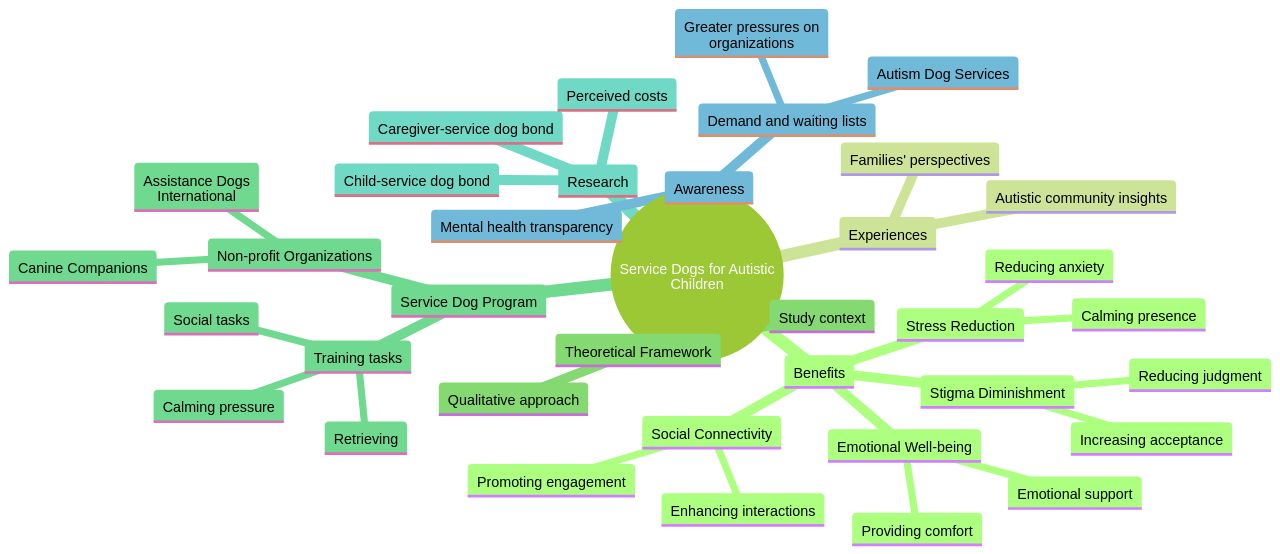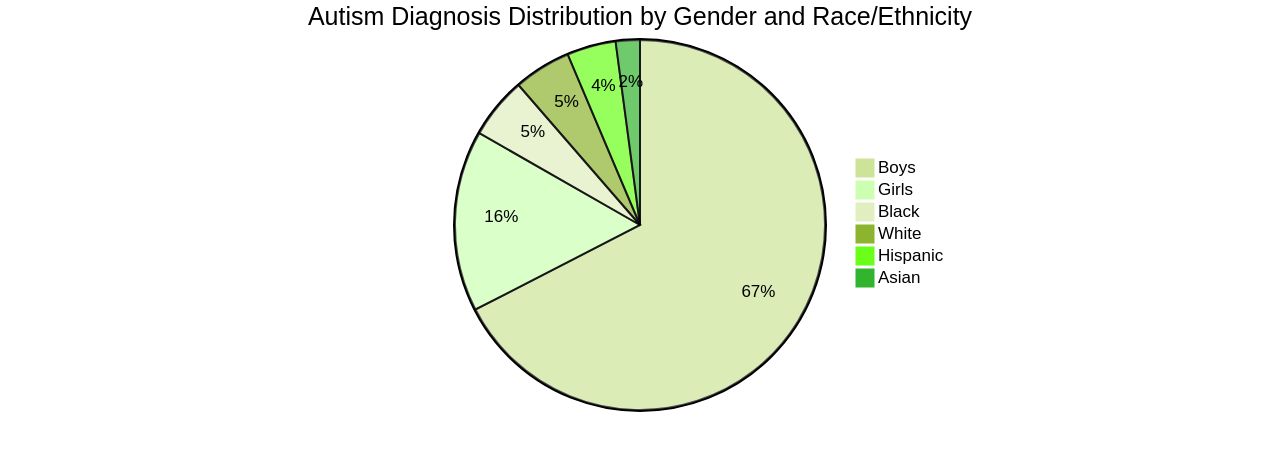Introduction
Autism Spectrum Disorder (ASD) presents a diverse array of traits that affect individuals differently, impacting social skills, communication, and behavior. Groundbreaking research has illuminated the profound positive influence service dogs have on children with autism and their families.
These canine companions become integral family members, enhancing resilience and joy within the household. In addition to exploring the role of service dogs, recent advances in understanding the complexities of ASD, such as genetic patterns and neural intricacies, are shedding light on potential new therapies. This article will delve into the key characteristics of autism, the impact of service dogs, and the importance of early diagnosis and intervention for children on the spectrum.
What is Autism?
Autism Spectrum Disorder (ASD) presents a diverse array of traits that affect individuals differently, impacting social skills, communication, and behavior. Groundbreaking research, like that from Dr. Maggie O'Haire's lab, published in Frontiers of Psychiatry, illuminates the profound positive influence service dogs have on children with autism and their families.
These canine companions are not just pets; they become integral family members, enhancing resilience and joy within the household. The study's qualitative approach underscores the service dog's role in fostering social connections, reducing stigma, and acting as a unique intervention for the child with autism.
In the realm of science, recent advances strive to unravel the complexities of ASD. Professor Kenkichi Takase and Professor Eiichi Nojiri have expanded on Donald Olding Hebb's theories, exploring the mental functionalities related to ASD.
Their study, published in Perspectives on Psychological Science, delves into the neural intricacies that shape behaviors associated with the condition. Moreover, the role of neurotransmitters like dopamine and serotonin in development and the construction of neural circuits is being closely examined, with implications for potential new therapies.
The human-animal bond is especially significant for those with ASD, and therapy dogs have been shown to maintain stable stress indicators, such as salivary cortisol and oxytocin levels, during interactions with autistic children. This underscores the mutual benefits of such relationships.
Furthermore, children supported by dogs in stressful situations exhibit lower stress levels than when they are alone or with parents. However, it is worth noting that research in this area requires further refinement to validate the benefits of dog-assisted therapy (DAT), which has been found to improve social interactions and communication in children with ASD. Statistics reveal that males are four times more likely to be diagnosed with autism, accounting for 81% of individuals with ASD. Challenges in education are prevalent, with 85% of school-aged children with autism reporting difficulties. Understanding these patterns is critical for providing tailored support and interventions that can enhance the quality of life for those on the spectrum. The recent report indicating that 1 in 36 children is diagnosed with ASD highlights the urgency of early diagnosis and intervention to ensure that children receive the necessary services.

The Autism Spectrum
Autism's wide-ranging spectrum includes a diverse array of experiences and challenges. Recent research has provided deeper insights into the lives of those touched by autism, particularly when service dogs are introduced into the family dynamic.
Studies conducted by the OHAIRE Group in partnership with Canine Companions have revealed that the presence of a service dog can significantly bolster the social connections of the family, easing the sense of judgment and stigma often encountered. These service dogs offer more than companionship; they serve as a personalized intervention, contributing positively to the emotional well-being of the child with autism and the entire family, fostering resilience and joy.
The impact of service dogs extends beyond the anecdotal, with research indicating tangible benefits. The studies showed that the therapy dogs working with autistic children did not exhibit increased stress indicators, such as salivary cortisol, compared to their days off, suggesting a mutually beneficial relationship.
This aligns with the human-animal bond theory, emphasizing the importance of the welfare of both parties in such interactions. Understanding autism's origins remains a complex endeavor, with researchers dispelling myths and focusing on genetic patterns and potential environmental factors. The disorder is not linked to vaccines, parenting styles, or nutrition but may involve a combination of genetic susceptibility and external triggers. Brain scans have disclosed differences in brain shape and structure, pointing to the neurological underpinnings of autism. These findings underscore the importance of continuing to explore the multifaceted nature of autism and its effects on individuals and families.

Key Characteristics of Autism
Autism, a complex condition that affects social skills, communication, and behavior, can manifest in unique ways. Individuals on the autism spectrum may experience challenges in social interactions, often struggling to read and respond to social cues.
Their communication might be affected, making it difficult to express themselves using typical language and gestures. Repetitive behaviors and an intense focus on specific interests are also common traits, providing comfort and structure but potentially limiting engagement in a broader range of activities.
Additionally, sensory sensitivities can make everyday environments overwhelming due to heightened responses to sounds, sights, or textures. Transitions and changes, even minor ones, can be particularly distressing, leading to anxiety or resistance to altering routines.
Research underscores the significance of the human-animal bond, especially in the context of autism. A study published in 'Frontiers of Psychiatry' found that service dogs offer substantial support for children with autism, improving family resilience and emotional well-being.
These dogs are not only companions but also catalysts for increased social interactions and sources of joy for the entire family. The study also spotlights the importance of considering the welfare of therapy dogs, ensuring their interactions with autistic children do not induce stress, as indicated by stable levels of stress biomarkers like cortisol and oxytocin. The growing awareness around mental health has led to a rise in demand for service dogs, particularly as adults diagnosed with autism are nearly three times more likely to encounter psychiatric conditions. Vicky Spadoni, Executive Director of Autism Dog Services, highlights that transparency about mental health has increased, but this also means longer waiting lists for assistance dogs. Jennifer de Jong from Hulphonden Voor Autisme echoes this, noting the life-changing impact these dogs have on individuals with autism.
Social Interaction and Communication
Autism spectrum disorder (ASD) encompasses a range of challenges, particularly in navigating social interactions. For individuals on the spectrum, making eye contact, understanding emotions, and using nonverbal signals can be complex tasks.
This is not only an issue for children with autism but for adults as well, who may face heightened psychiatric conditions and a need for support. Groundbreaking research, led by Dr. Maggie O'Haire and the OHAIRE Group, has shed light on the profound influence service dogs have on children with autism and their families.
Published in Frontiers of Psychiatry, the study reveals that service dogs not only bolster the child's social connectivity but also enhance the family's resilience and emotional well-being. These dogs, embraced as family members, have been shown to reduce stress in children during challenging times more effectively than parental support alone.
Furthermore, Canine Companions' innovative research has found that the presence of service dogs can diminish the stigma and judgment families often encounter. As we recognize the spectrum of autism and its varied presentations, it's crucial to understand that each individual's experience is unique. While some may prefer 'identity-first' language, others opt for 'person-first' terminology, reflecting the diverse perspectives within the autistic community. The benefits of service dogs extend beyond companionship, offering a specialized intervention that supports the entire family unit in unique and meaningful ways.

Repetitive Behaviors and Restricted Interests
When we look closely at the unique behaviors associated with autism, we find patterns such as hand-flapping, rocking, and lining up objects that are often observed. These repetitive actions are not only common but can be a source of comfort and stability for individuals on the autism spectrum.
Furthermore, these individuals may immerse themselves deeply in particular subjects or activities, and this intense focus can sometimes overshadow other areas of interest. In a recent study published in Frontiers of Psychiatry, the influence of service dogs on autistic children and their families was examined.
The study highlighted the profound positive impact service dogs have, not only on the child but on the entire family unit. These dogs are embraced as cherished family members, contributing to improved emotional well-being and family resilience by enhancing interactions and providing joy.
Moreover, research from the Family Dog Project has shed light on the exceptional abilities of certain dogs, such as learning and remembering the names of numerous toys, a rare talent that has been scarcely studied due to its rarity. This intriguing phenomenon suggests a potential area of connection between humans and dogs, especially considering the therapeutic roles dogs can play in the lives of individuals with autism. The importance of recognizing autism early cannot be overstated, as children diagnosed by age four are significantly more likely to receive critical services. Unfortunately, disparities remain in diagnosis rates, with boys being diagnosed about four times more often than girls, and White and Black children identified more frequently than Hispanic children. These gaps highlight the need for increased awareness and access to diagnostic services across all communities.

Conclusion
In conclusion, service dogs have a profound positive influence on children with autism and their families. They enhance social connections, reduce stigma, and act as unique interventions.
The human-animal bond is crucial in the context of autism, with therapy dogs maintaining stable stress levels during interactions. Understanding the key characteristics of autism, such as challenges in social interactions, communication difficulties, repetitive behaviors, and sensory sensitivities, is vital for tailored support.
Service dogs play a vital role in fostering social interactions, reducing stress levels, and bringing joy to the entire family. Early diagnosis and intervention are essential for children with autism to receive necessary services.
Increasing awareness and access to diagnostic services is needed to address disparities in diagnosis rates across communities. In summary, service dogs are invaluable companions for children with autism. They improve social connections and overall well-being. Understanding autism's key characteristics and advocating for early diagnosis and intervention are crucial steps towards supporting individuals on the spectrum and ensuring their quality of life.




